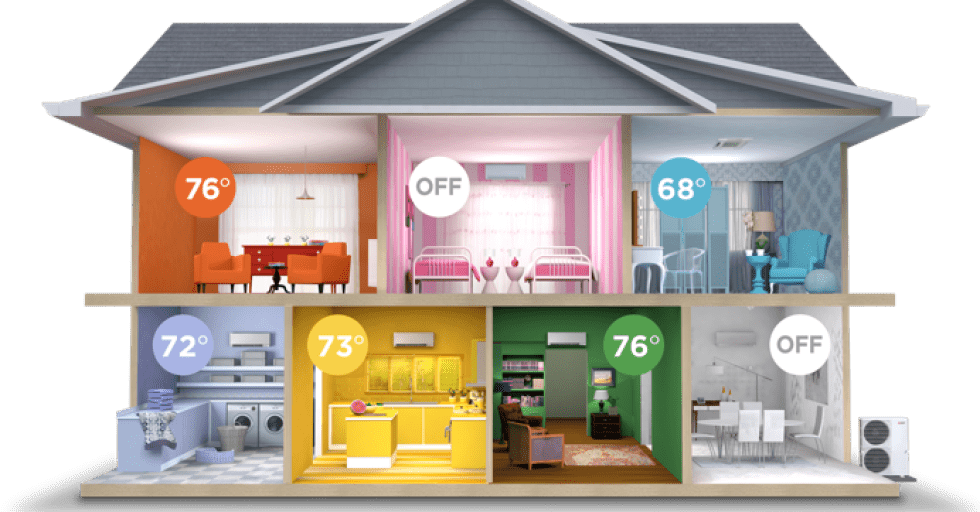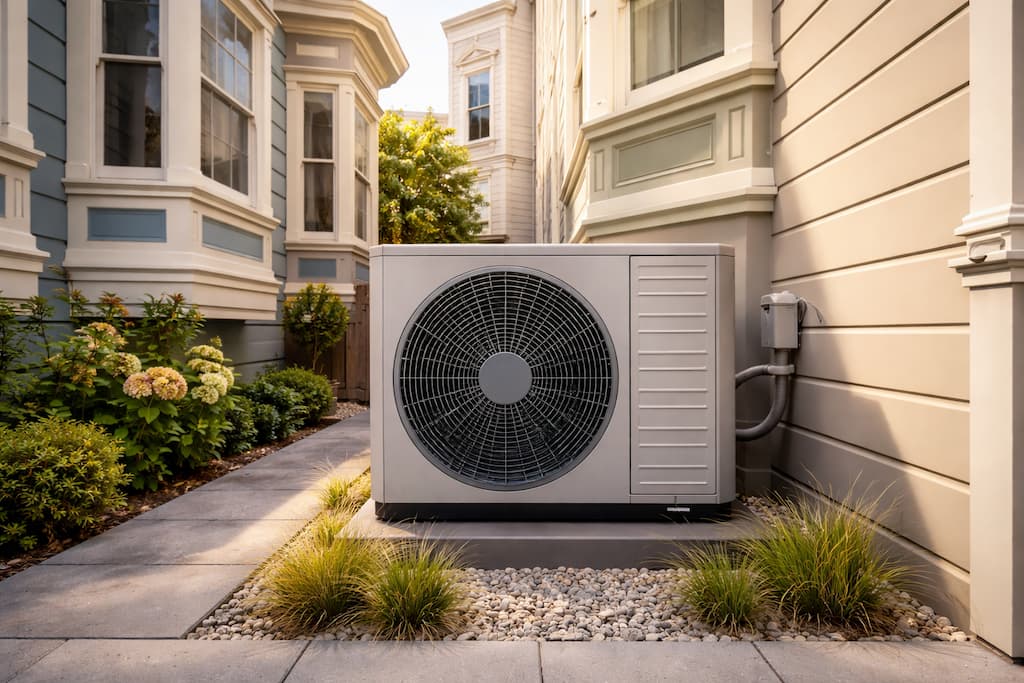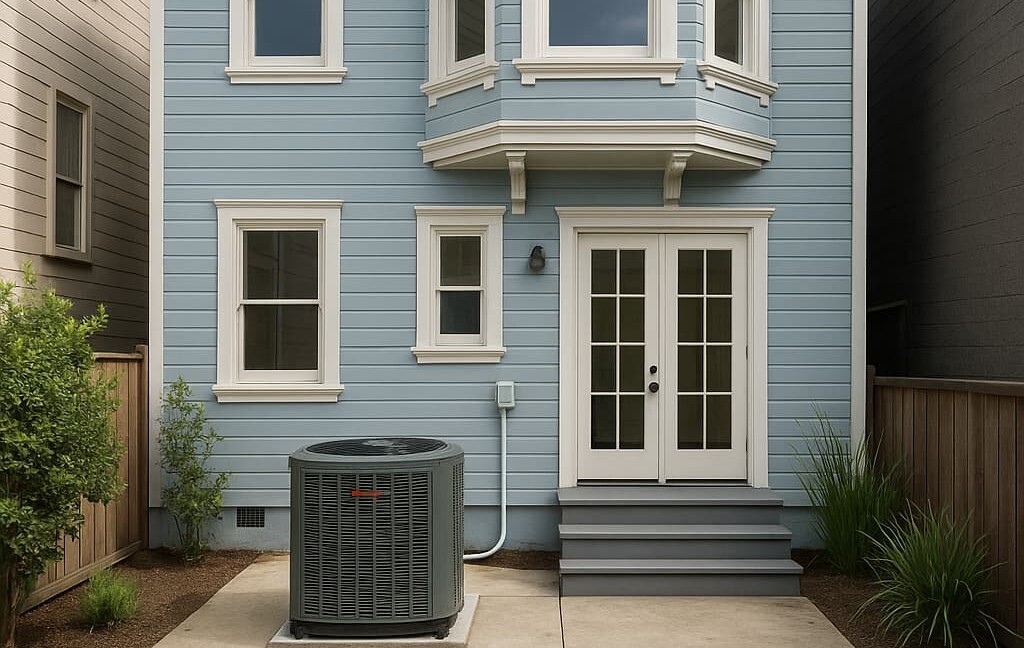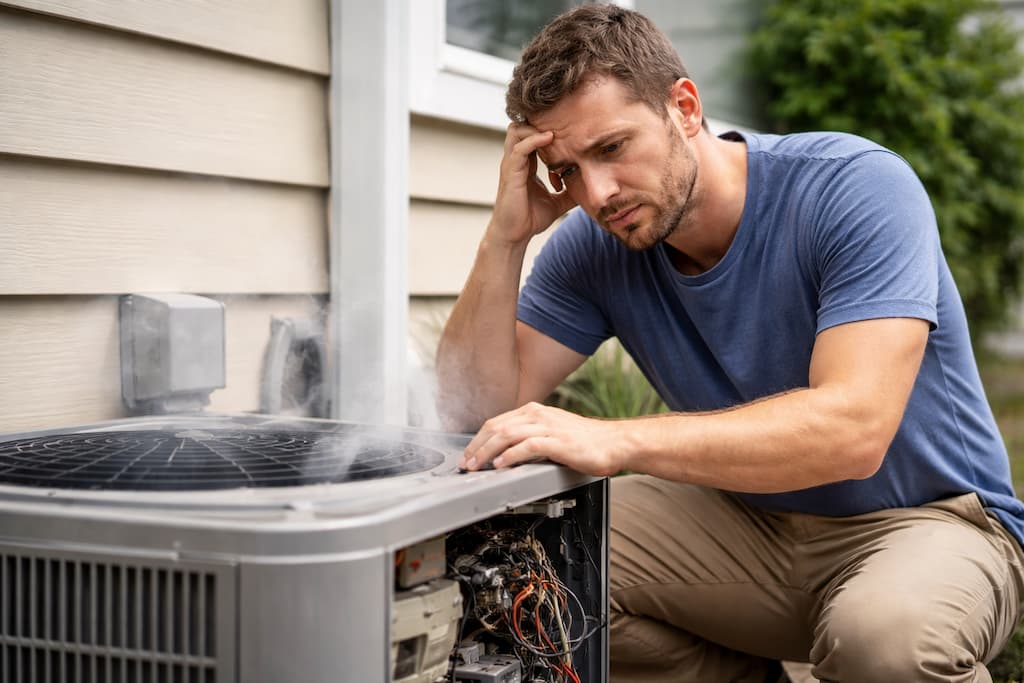Heat pumps and furnaces both heat your home, but they work completely differently. Heat pumps transfer heat using electricity and provide both heating and cooling, while furnaces generate heat by burning gas or other fuels. For Bay Area homeowners, heat pumps often make more sense due to our mild winters, lower operating costs, and superior energy efficiency.
Choosing between these heating systems impacts your comfort, energy bills, and long-term costs. This guide breaks down everything you need to know about heat pumps vs furnaces to help you make the right decision for your Santa Cruz, Marin, Santa Clara, or Sonoma County home.
What Is a Heat Pump and How Does It Work?
Heat pumps work like your refrigerator but in reverse. They use thermodynamics to move heat from one place to another rather than generating it by burning fuel. During winter, they extract warmth from outdoor air and transfer it inside your home. In summer, they reverse this process to provide cooling.
This dual functionality makes heat pumps incredibly versatile. You get both heating and air conditioning in one system, which can eliminate the need for separate equipment.
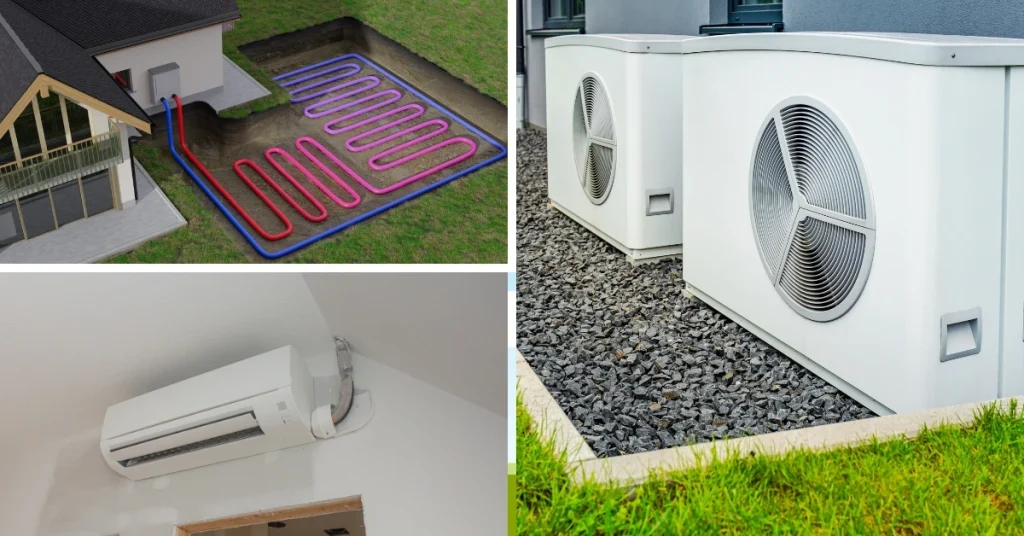
Types of heat pumps include
- Air-to-Air Heat Pumps: The most common type, transferring heat between outdoor and indoor air through refrigerant cycles.
- Ductless Mini-Split Systems: Ideal for homes without existing ductwork, featuring an outdoor compressor connected to multiple indoor units for zone control.
- Geothermal Heat Pumps: The most efficient option, utilizing stable underground temperatures as a power source for both heating and cooling.
According to the U.S. Department of Energy, modern heat pumps can operate efficiently in temperatures as low as 0 degrees Fahrenheit. While older models struggled in extreme cold, newer technology has dramatically improved cold-weather performance, making them viable even in colder climates when paired with backup heating.
What Is a Furnace and How Does It Work?
Furnaces generate heat by burning fuel or using electric resistance within the unit itself. Gas furnaces combust natural gas or propane in a sealed chamber, producing hot gases that warm air before it’s distributed throughout your home via ductwork and vents.
Unlike heat pumps that move existing heat, furnaces create heat from scratch. This allows them to produce extremely hot air quickly, reaching temperatures around 130-140 degrees Fahrenheit regardless of outdoor conditions.
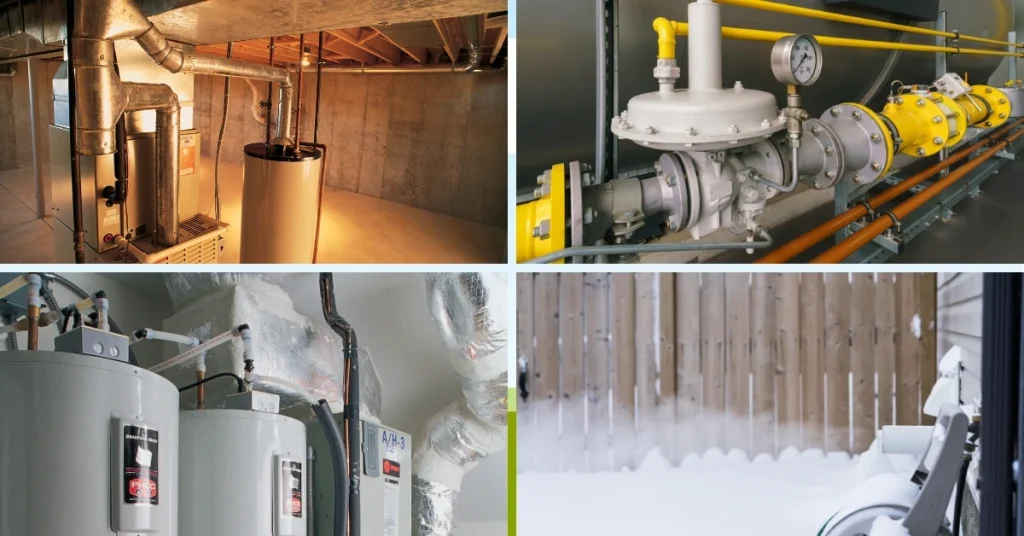
Furnace types include
- Single-Stage Furnaces: Operating at one high setting, these are less efficient but more affordable upfront.
- Two-Stage Furnaces: Offering both high and low settings for better efficiency during milder weather while providing ample warmth when needed.
- Modulating Furnaces: Continuously adjusting output levels based on demand for optimal comfort and efficiency throughout the day.
- Direct Vent Furnaces: Drawing combustion air from outside instead of using indoor air, reducing potential carbon monoxide risks.
Gas furnaces remain popular in colder climates where consistent, powerful heat production is essential during harsh winters.
Key Differences Between Heat Pump and Gas Furnace
The fundamental difference between heat pumps and gas furnaces lies in how they create warmth. Heat pumps transfer existing heat using electricity, making them up to three times more efficient than traditional heating systems. Furnaces generate heat through combustion, providing more powerful heating output but consuming more energy in the process.
- Energy source matters significantly: Heat pumps run entirely on electricity, while gas furnaces require natural gas or propane lines. If your home doesn’t already have gas service, installation costs for a furnace can increase substantially—sometimes $500 to $2,000 or more for new gas line installation.
- Environmental impact differs considerably: Heat pumps reduce greenhouse gas emissions since they don’t burn fossil fuels. They’re an excellent choice for eco-friendly HVAC and homeowners prioritizing sustainability and reducing their carbon footprint.
Which One Is Better?
The answer depends entirely on your climate, existing infrastructure, and priorities. For Bay Area residents in Santa Cruz, Marin, Santa Clara, and Sonoma counties, heat pumps typically offer superior value.
Our region’s mild winters rarely see temperatures below freezing, which is where heat pumps excel. They operate most efficiently in temperatures between 25-60 degrees Fahrenheit—exactly what we experience throughout most of our heating season.
Heat pumps are ideal if you
- Need both heating and cooling (eliminates separate AC purchase)
- Want lower monthly energy bills
- Prioritize environmental sustainability
- Live in areas with mild to moderate winters
- Don’t have existing gas lines to your home
Furnaces make more sense if you
- Experience frequent below-zero temperatures
- Already have natural gas infrastructure
- Need extremely fast heating recovery
- Prioritize upfront cost savings over long-term efficiency
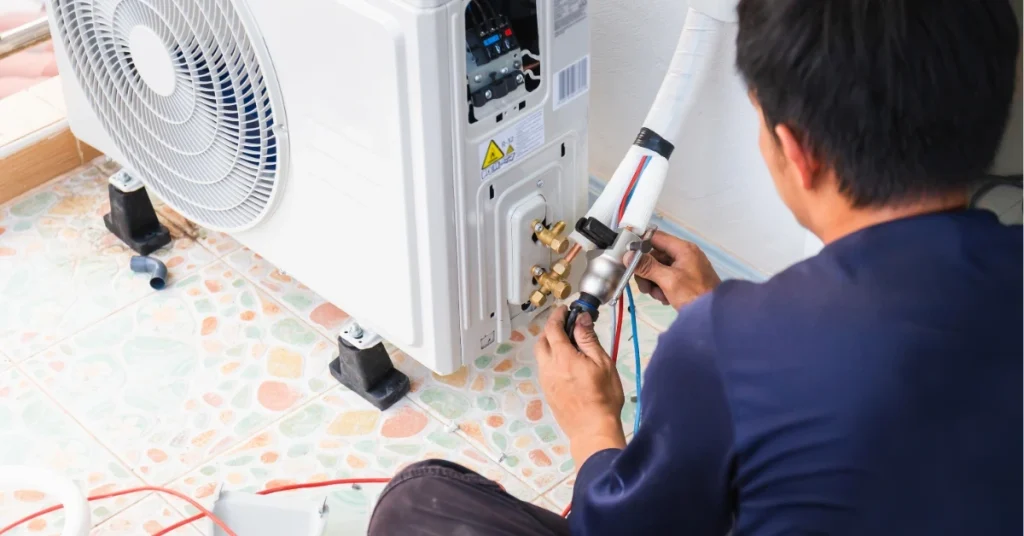
Choosing between a heat pump and a furnace depends on your climate, existing infrastructure, and priorities. Below, you’ll find another detailed comparisons and valuable insights to help you make the best decision for your home.
Efficiency Comparison
Heat pumps dominate efficiency comparisons, offering up to 300% efficiency by moving heat rather than creating it. For every unit of electricity consumed, a heat pump can deliver three units of heat to your home. This remarkable efficiency translates directly to lower energy bills.
Gas furnaces, even high-efficiency models, max out around 95-98% efficiency. They can only convert the fuel they burn into heat—they can’t create more heat than the energy they consume.
According to the U.S. Department of Energy, heat pumps can reduce electricity use for heating by up to 75% compared to electric resistance heating like furnaces and baseboard heaters. This efficiency advantage becomes especially pronounced in mild climates like the Bay Area, where heat pumps operate in their optimal temperature range.
The efficiency gap narrows only in extremely cold weather, when heat pumps must work harder to extract heat from frigid outdoor air. But in our region, this scenario rarely occurs.
Cost Comparison
Upfront installation costs for heat pumps typically run higher than gas furnaces. Heat pump systems generally cost between $2,500-$10,000 installed depending on home size and system type, while gas furnaces range from $700-$3,300 for installation.
However, if you don’t have existing gas lines, adding natural gas service can narrow or eliminate this cost difference. Plus, heat pumps replace both your furnace and air conditioner, so comparing total HVAC replacement costs reveals heat pumps often cost less overall than buying separate heating and cooling systems.
Operating costs tell a different story
Heat pumps typically cost less to run monthly because of their superior energy efficiency. While natural gas prices fluctuate, electricity rates remain relatively stable. Most Bay Area homeowners see lower energy bills with properly-sized heat pump systems.
Available incentives and rebates make heat pumps even more attractive financially. Federal tax credits through the Inflation Reduction Act offer up to 30% back (maximum $2,000) on heat pump purchase and installation. California also offers additional state and utility rebates that can significantly reduce upfront costs.
Calculate your specific costs using local energy rates and available rebates to determine true savings over your system’s 15-20 year lifespan.
However, many Bay Area homeowners find that heat pumps provide all the heating capacity they need while delivering significant cost savings and year-round comfort.
Installation Complexity Comparison
Installation complexity differs significantly between these systems.
- Heat pumps require both outdoor and indoor units with refrigerant lines connecting them, making installation more time-consuming than furnaces. Proper refrigerant line installation, electrical work, and outdoor unit placement all require careful planning and execution.
- Gas furnaces have simpler installations requiring flue connections, gas line hookup (if existing), and ductwork connections. Experienced HVAC technicians can typically complete furnace installations faster than heat pump installations.
However, high-efficiency gas furnaces may require additional venting modifications or air intake systems, adding complexity. Both systems need proper sizing calculations to ensure optimal performance and efficiency.
Working with experienced local HVAC professionals ensures proper installation regardless of which system you choose. Improper installation can reduce efficiency by 30% or more, so professional expertise is essential.
Maintenance Requirements
Both systems need regular professional maintenance, but heat pumps require slightly more attention since they work year-round for heating and cooling. Understanding the heat pump maintenance requirements is essential for optimal performance. Furnaces only operate during winter months, so their maintenance schedule is simpler.
What to expect with maintenance:
- Heat pumps need seasonal tune-ups covering filters, outdoor coils, refrigerant levels, and electrical connections. Since they run continuously, catching small issues early prevents costly breakdowns.
- Gas furnaces require annual safety inspections focused on combustion efficiency, carbon monoxide detection, and proper venting. This isn’t optional—neglecting furnace maintenance creates serious safety risks.
Investing in professional maintenance extends your system’s lifespan by 5-10 years, keeps energy bills low, and prevents emergency failures during the coldest nights. The cost of annual service is a fraction of what you’d pay for premature replacement or emergency repairs.
At Bellows Service, our maintenance plans keep Bay Area heating systems running efficiently and safely. Our experienced technicians provide comprehensive service tailored to your specific equipment, giving you peace of mind year-round.
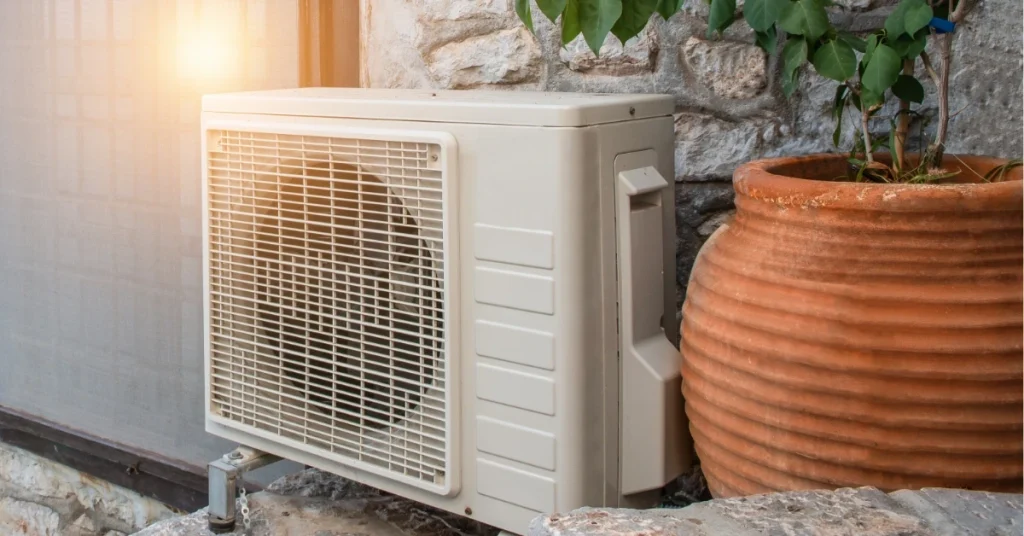
Heat Pumps vs Furnaces in Bay Area Climates
Bay Area climates are nearly perfect for heat pump operation. Our winters rarely drop below freezing, and temperatures typically range from 40-60 degrees during heating season—exactly where heat pumps operate most efficiently and cost-effectively.
Gas furnaces can actually provide too much heat in our mild climate. When outdoor temperatures sit between 40-60 degrees, powerful furnace output feels excessive, creates hot spots, and wastes energy. Heat pumps deliver more consistent, comfortable temperature control without overshooting your thermostat settings.
The mild weather also means heat pumps avoid the efficiency losses that occur in harsh cold. While homeowners in extreme cold-weather regions like Minnesota or Alaska might need dual-fuel systems—pairing a heat pump with a backup furnace that only activates during the coldest days—Bay Area residents can rely on heat pumps as their primary and often only heating source year-round. This dual-fuel approach is rarely necessary in Santa Cruz, Marin, Santa Clara, or Sonoma counties.
California’s push toward electrification and sustainability makes heat pumps increasingly attractive. State and local regulations increasingly favor all-electric homes, and many jurisdictions offer enhanced rebates for transitioning from gas to electric heating systems through programs like TECH Clean California.
Should You Replace Your Gas Furnace With a Heat Pump?
If your gas furnace is nearing the end of its 15-20 year lifespan, replacing it with a heat pump makes excellent financial and environmental sense for most Bay Area homeowners.
Consider replacement if:
- Your current furnace is over 15 years old
- You’re planning to add air conditioning anyway
- Energy bills have increased significantly
- You want to reduce your carbon footprint
- Available rebates and incentives make the upgrade affordable
Evaluate these factors:
- Current energy costs and potential savings with a heat pump
- Available federal, state, and utility rebates (often $2,000-$5,000+ total)
- Whether you need to add or upgrade electrical service
- Your home’s existing ductwork condition
- Long-term energy cost projections and environmental goals
Many Bay Area homeowners discover that heat pump operating savings, combined with available incentives, make replacement financially attractive even before their furnace completely fails. Planning ahead allows you to choose the best system and timing rather than making emergency decisions when equipment fails unexpectedly.
Consult with qualified HVAC professionals who can assess your specific home, calculate accurate costs and savings, and recommend the optimal heating solution for your needs. At Bellows Service, our experienced technicians help Santa Cruz, Marin, Santa Clara, and Sonoma County homeowners navigate these decisions with expert guidance and transparent pricing.
Ready to explore whether a heat pump or furnace is right for your home? Contact Bellows Service today for a comprehensive heating system evaluation and personalized recommendations based on your unique needs and priorities.
FAQs About Heat Pump vs Gas Furnace
Do heat pumps work in cold weather?
Yes, modern heat pumps work effectively in cold weather. Today’s cold-climate heat pumps maintain efficiency down to 5 degrees Fahrenheit and continue operating even below zero. While older models struggled in freezing temperatures, advances in compressor technology and refrigerants have made heat pumps viable heating solutions even in northern climates. For Bay Area homes, where temperatures rarely drop below freezing, heat pumps provide reliable heating throughout winter without requiring backup systems.
Is it cheaper to heat with a heat pump or gas furnace?
In the Bay Area, heat pumps typically cost less to operate than gas furnaces due to their superior energy efficiency. Heat pumps can be up to three times more efficient than furnaces, transferring three units of heat for every unit of electricity consumed.
While natural gas may have lower per-unit energy costs, heat pumps’ efficiency advantage usually results in lower monthly bills. Your specific savings depend on local electricity and gas rates, but most Bay Area homeowners see reduced energy costs with heat pumps.
Can I keep my furnace and add a heat pump?
Yes, you can keep your existing furnace and add a heat pump in what’s called a dual-fuel system. The heat pump handles most heating and all cooling duties efficiently, while the furnace provides backup heat during the coldest days. This setup maximizes efficiency and comfort, though it’s rarely necessary in Bay Area climates. For most local homeowners, a standalone heat pump provides sufficient heating capacity year-round without requiring furnace backup.
How long do heat pumps last compared to furnaces?
Heat pumps typically last 15-20 years with proper maintenance, similar to gas furnaces. However, because heat pumps operate year-round for both heating and cooling, they may experience slightly more wear than furnaces that only run during winter.
Regular professional maintenance extends the lifespan of both systems significantly. Quality installation and annual tune-ups are the most important factors in maximizing your heating system’s longevity, regardless of which type you choose.
Do you need special electrical service for a heat pump?
Most homes have sufficient electrical capacity for heat pump installation, but older homes may require electrical panel upgrades. Heat pumps run on electricity rather than gas, so they need adequate power supply to operate efficiently.
A qualified HVAC technician can assess your current electrical service during the consultation. Any necessary electrical upgrades typically cost $1,500-$3,000 but may qualify for additional rebates. Many Bay Area homes built in recent decades already have appropriate electrical capacity.
Will a heat pump increase my electricity bill?
While heat pumps use electricity for operation, they typically lower overall energy costs compared to gas heating and separate air conditioning.
Heat pumps are so efficient that despite running on electricity, they usually cost less to operate than gas furnaces. However, if you’re replacing a gas furnace and don’t currently have air conditioning, your summer electricity usage will increase because you’ll now be cooling your home. Most homeowners see net annual savings when considering both heating and cooling costs together.


